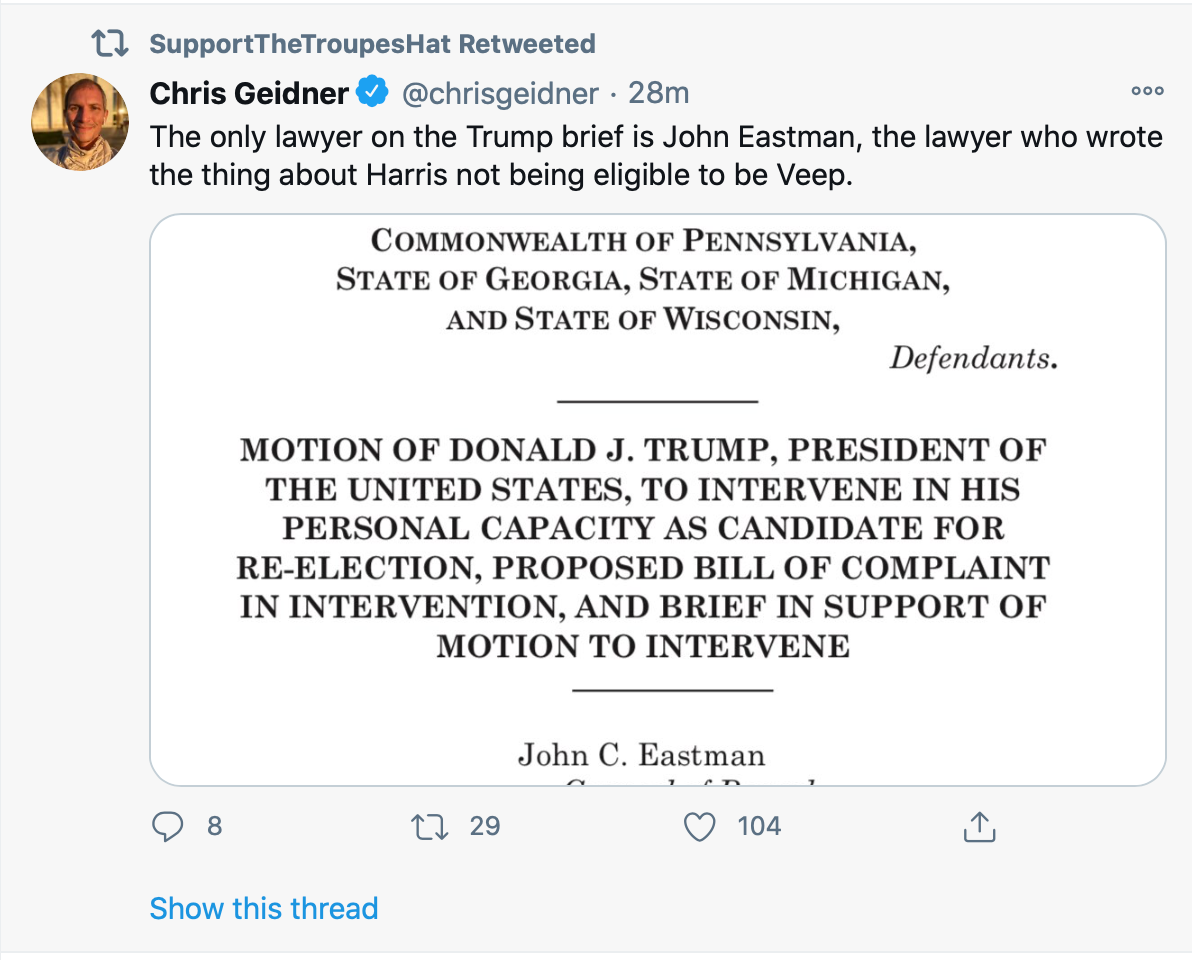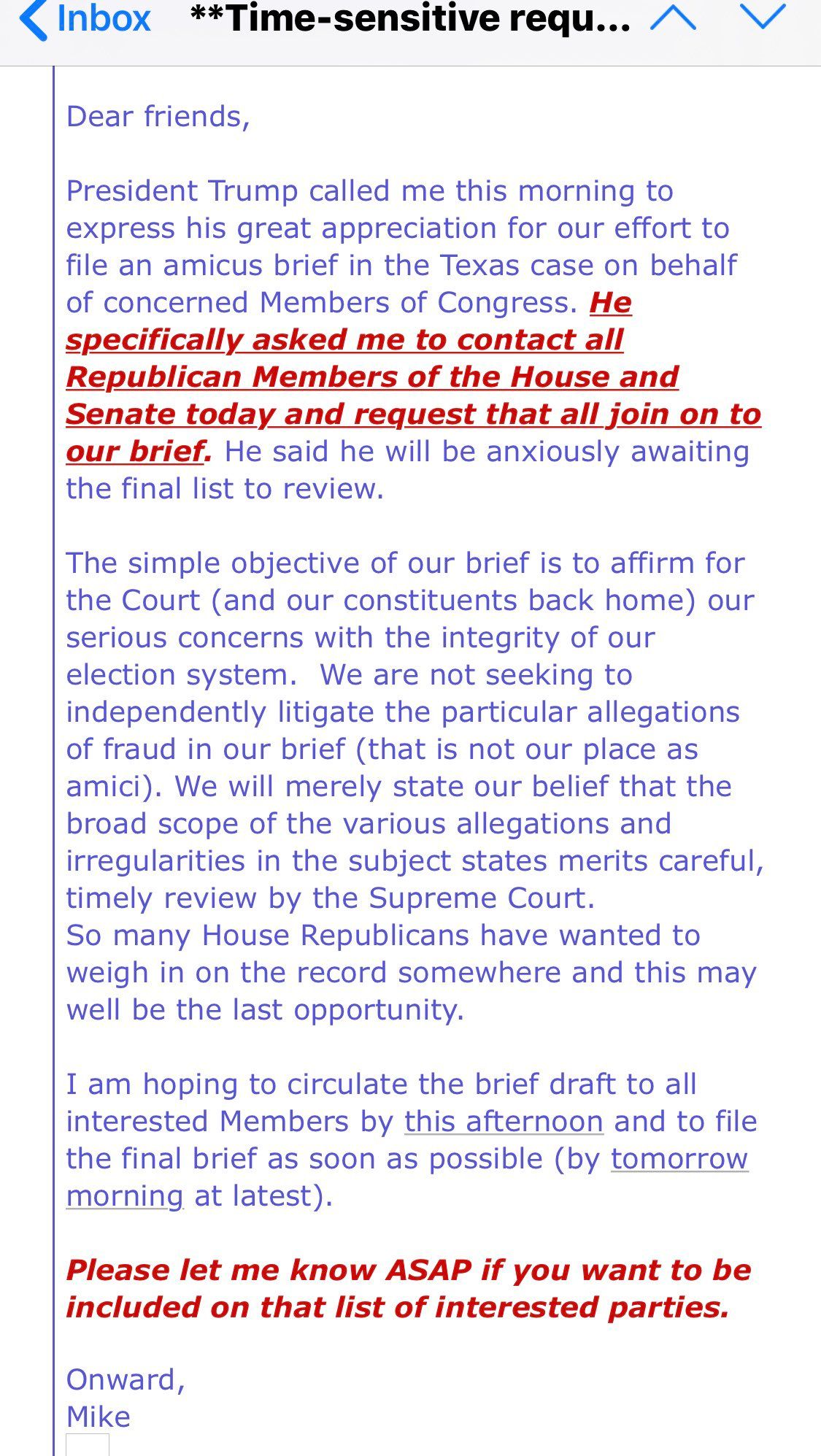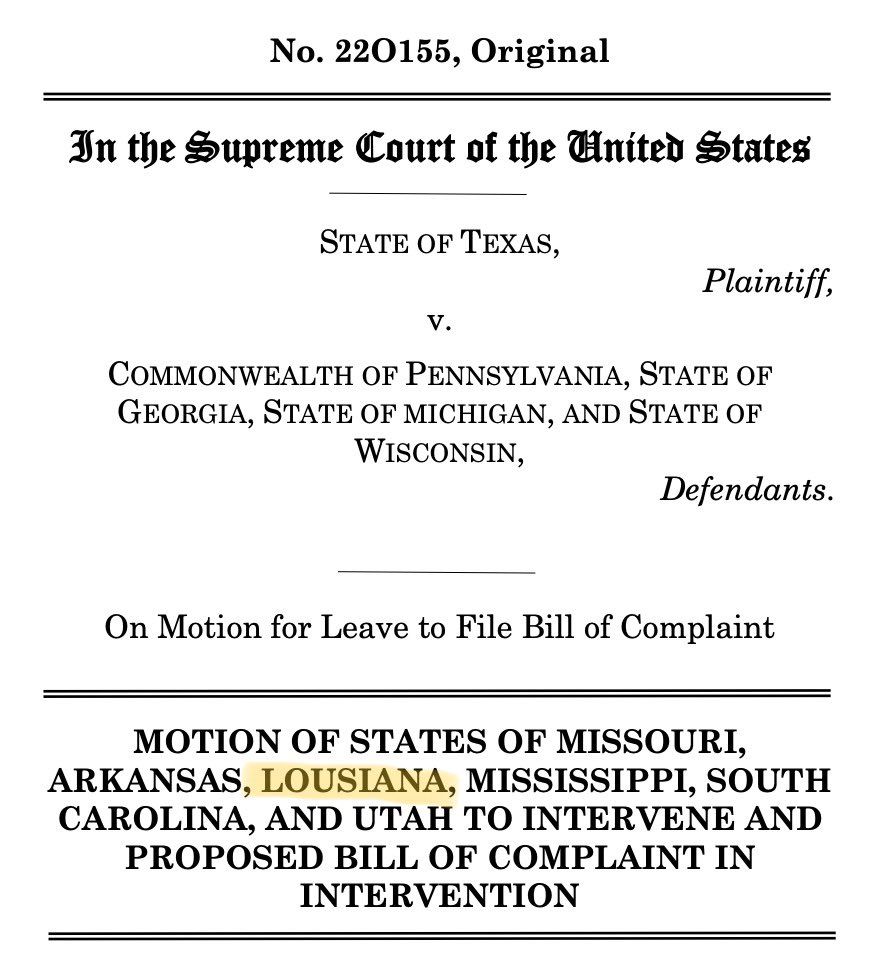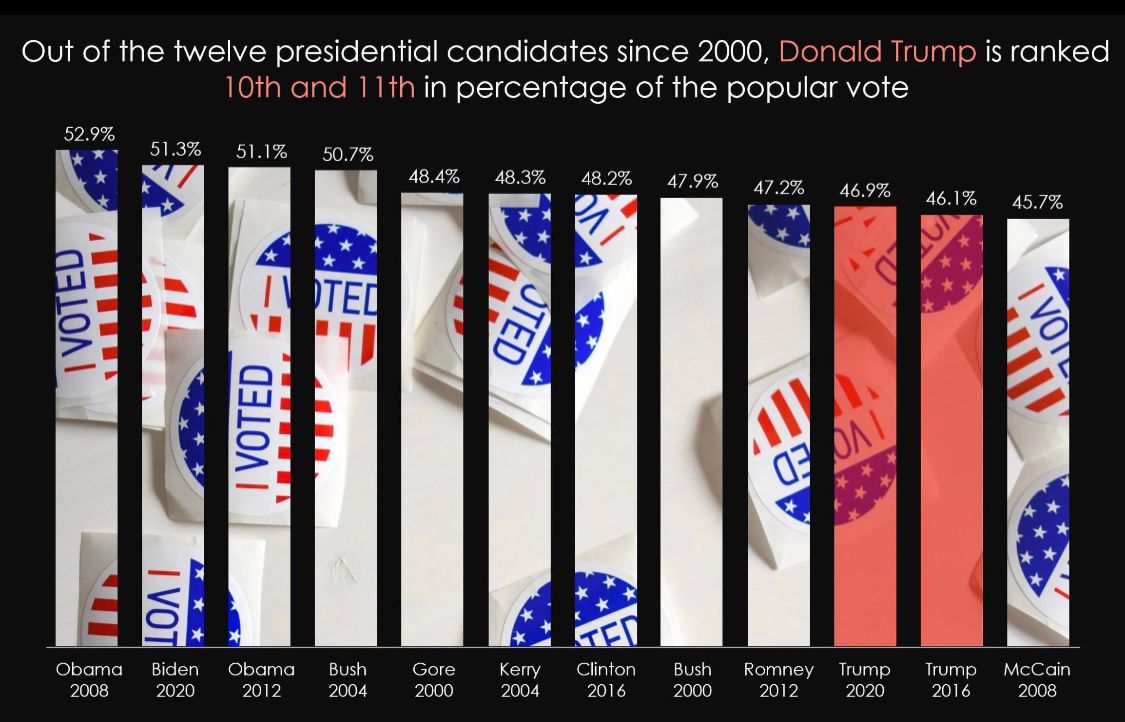Trump trying to get the GOP to sign on to Texas’s useless lawsuit
-
Trump vows to intervene in the suit.
https://www.reuters.com/article/usa-election-trump-idUSKBN28J1VJ
@jon-nyc said in Trump trying to get the GOP to sign on to Texas’s useless lawsuit:
Trump vows to intervene in the suit.
https://www.reuters.com/article/usa-election-trump-idUSKBN28J1VJ

-
Andrew McCarthy on the suit:
If Texas’s theory is right, then every state now has standing to sue every other state over the latter’s administration of its own laws in connection with its own citizens if it can articulate some collateral consequence that may affect the allegedly injured state in some way. I have a hard time believing that the “Don’t Mess with Texas” State will want to live in the world that its attorney general proposes to create.
In point of fact, every claim raised in Texas’s complaint has already been rejected by other courts; in particular, the Third Circuit Court of Appeals (in two cases, here and here) and the federal district court in Pennsylvania (here).
Texas’s principal claim, for example, is that by administering the election in a way that deviated from their states’ laws, election officials in the defendant states usurped the authority of their state legislatures, in violation of the Constitution’s Electors Clause (Art. II, Sec. 1, Cl. 2). The Third Circuit has explained that not even the citizens of the states where this happened nor candidates for office have standing to press such a claim. How on earth would a different, comparatively unaffected state have standing? Not surprisingly, the rambling discussion of standing principles in Paxton’s brief cites no case holding that a state has standing to challenge another state’s administration of an election.
Finally, in its proposed lawsuit, Texas does exactly what the Third Circuit, in Trump for President v. Secretary, Commonwealth of Pennsylvania, recently said a litigant may not do. It waited until the eleventh hour to file (beyond that, actually — the complaint was not submitted until after midnight on the federal safe-harbor day). It pleads conclusory allegations (including some, such as mentions of Dominion software, that are plainly included for atmospheric effect, unconnected to any claim for relief). It posits claims that have already been litigated and lost by parties that, unlike Texas, had some cognizable interests. And it seeks unprecedented, drastic relief — the undoing of other states’ elections and disenfranchisement of their citizens; the invocation of the Court’s purported “remedial authority” to order a new “special” election in those states; the vacating of the certification of electors by those states, and the barring of those states from voting in the Electoral College — without citing any case in which the courts have found such breathtaking authority to exist, much less exercised it.
-
Andrew McCarthy on the suit:
If Texas’s theory is right, then every state now has standing to sue every other state over the latter’s administration of its own laws in connection with its own citizens if it can articulate some collateral consequence that may affect the allegedly injured state in some way. I have a hard time believing that the “Don’t Mess with Texas” State will want to live in the world that its attorney general proposes to create.
In point of fact, every claim raised in Texas’s complaint has already been rejected by other courts; in particular, the Third Circuit Court of Appeals (in two cases, here and here) and the federal district court in Pennsylvania (here).
Texas’s principal claim, for example, is that by administering the election in a way that deviated from their states’ laws, election officials in the defendant states usurped the authority of their state legislatures, in violation of the Constitution’s Electors Clause (Art. II, Sec. 1, Cl. 2). The Third Circuit has explained that not even the citizens of the states where this happened nor candidates for office have standing to press such a claim. How on earth would a different, comparatively unaffected state have standing? Not surprisingly, the rambling discussion of standing principles in Paxton’s brief cites no case holding that a state has standing to challenge another state’s administration of an election.
Finally, in its proposed lawsuit, Texas does exactly what the Third Circuit, in Trump for President v. Secretary, Commonwealth of Pennsylvania, recently said a litigant may not do. It waited until the eleventh hour to file (beyond that, actually — the complaint was not submitted until after midnight on the federal safe-harbor day). It pleads conclusory allegations (including some, such as mentions of Dominion software, that are plainly included for atmospheric effect, unconnected to any claim for relief). It posits claims that have already been litigated and lost by parties that, unlike Texas, had some cognizable interests. And it seeks unprecedented, drastic relief — the undoing of other states’ elections and disenfranchisement of their citizens; the invocation of the Court’s purported “remedial authority” to order a new “special” election in those states; the vacating of the certification of electors by those states, and the barring of those states from voting in the Electoral College — without citing any case in which the courts have found such breathtaking authority to exist, much less exercised it.
@jon-nyc said in Trump trying to get the GOP to sign on to Texas’s useless lawsuit:
Andrew McCarthy on the suit:
If Texas’s theory is right, then every state now has standing to sue every other state over the latter’s administration of its own laws in connection with its own citizens if it can articulate some collateral consequence that may affect the allegedly injured state in some way. I have a hard time believing that the “Don’t Mess with Texas” State will want to live in the world that its attorney general proposes to create.
In point of fact, every claim raised in Texas’s complaint has already been rejected by other courts; in particular, the Third Circuit Court of Appeals (in two cases, here and here) and the federal district court in Pennsylvania (here).
Texas’s principal claim, for example, is that by administering the election in a way that deviated from their states’ laws, election officials in the defendant states usurped the authority of their state legislatures, in violation of the Constitution’s Electors Clause (Art. II, Sec. 1, Cl. 2). The Third Circuit has explained that not even the citizens of the states where this happened nor candidates for office have standing to press such a claim. How on earth would a different, comparatively unaffected state have standing? Not surprisingly, the rambling discussion of standing principles in Paxton’s brief cites no case holding that a state has standing to challenge another state’s administration of an election.
Finally, in its proposed lawsuit, Texas does exactly what the Third Circuit, in Trump for President v. Secretary, Commonwealth of Pennsylvania, recently said a litigant may not do. It waited until the eleventh hour to file (beyond that, actually — the complaint was not submitted until after midnight on the federal safe-harbor day). It pleads conclusory allegations (including some, such as mentions of Dominion software, that are plainly included for atmospheric effect, unconnected to any claim for relief). It posits claims that have already been litigated and lost by parties that, unlike Texas, had some cognizable interests. And it seeks unprecedented, drastic relief — the undoing of other states’ elections and disenfranchisement of their citizens; the invocation of the Court’s purported “remedial authority” to order a new “special” election in those states; the vacating of the certification of electors by those states, and the barring of those states from voting in the Electoral College — without citing any case in which the courts have found such breathtaking authority to exist, much less exercised it.
It goes back to what I said about Trump’s first attempt in PA. He has no standing or right for the basis of the claim. The PA State Legislature (Republican) did. If they had filed the suit it would have been heard and had some weight. They didn’t.
-
Jon, you can try to explain this away all you want, but the fact is this is real, and it's not going to end well for you., lol
@Larry said in Trump trying to get the GOP to sign on to Texas’s useless lawsuit:
Jon, you can try to explain this away all you want, but the fact is this is real, and it's not going to end well for you., lol
Larry, you’re being played hard. The lead lawyers are playing Trump in hopes of securing pardons and the politicians are playing folks like you. Only suckers still believe in this shit. Don’t be one of them.


 all of this is so dumb and childish.
all of this is so dumb and childish.
